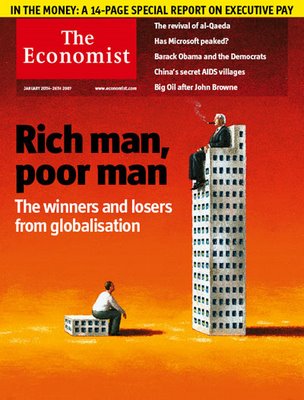
Since 2001 the pay of the typical worker in the United States has been stuck, with real wages growing less than half as fast as productivity. By contrast, the executive types gathering for the World Economic Forum in Davos in Switzerland next week have enjoyed a Beckhamesque bonanza. If you look back 20 years, the total pay of the typical top American manager has increased from roughly 40 times the average—the level for four decades—to 110 times the average now.
the top hundredth—or even the top thousandth—of the population are seizing the lion's share of globalisation's gains.
If globalisation depends upon voters who, as workers, no longer think they gain from it, how long before democracies start to put up barriers to trade?
For economists, the debate about whether technology or globalisation is responsible for capital's rewards outpacing those of labour is crucial, complicated and unresolved.
No comments:
Post a Comment